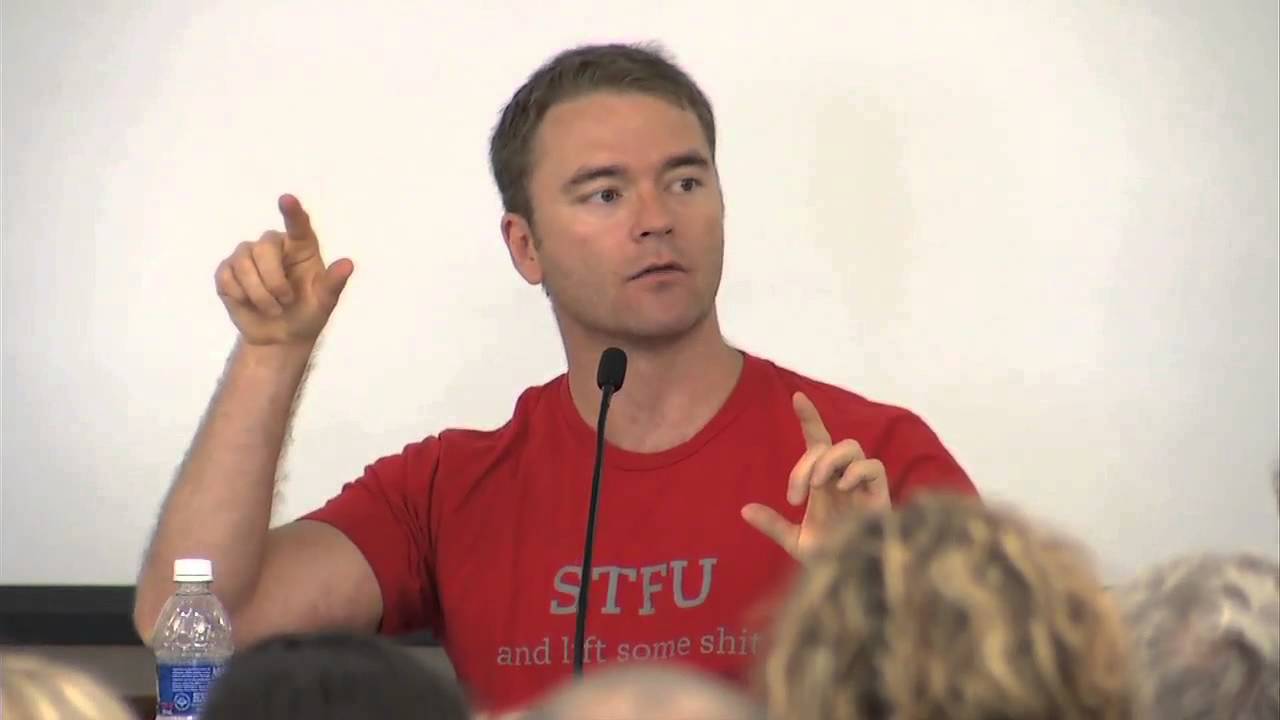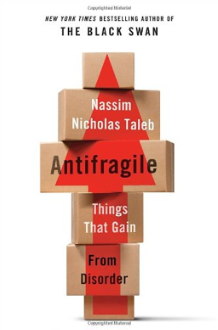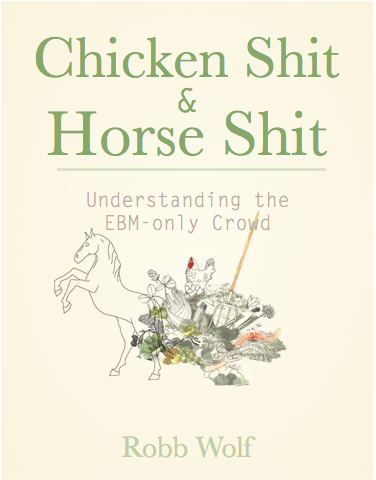11 Questions with Robb Wolf

Introduction to Robb Wolf
Robb Wolf hardly needs an introduction to readers in the ancestral health community. In this conversation, he discusses what he is reading, the systems-level goals behind his work, how he thinks about randomized controlled trials relative to clinical practice, and why evolutionary biology should inform medicine. The exchange also covers market signals like the gluten-free boom, the case for decentralized food systems, and the practical realities of speaking about polarizing topics while building a movement.
Key themes at a glance
| Theme | Summary |
|---|---|
| Reading & influences | Alternates between science fiction and economics or systems books. Currently revisiting Taleb’s Antifragile, alongside John Ringo’s sci-fi. |
| Biggest accomplishment | A risk assessment program piloted in Reno that integrates food production, fitness, community, and decentralized health. |
| Evidence standards | RCTs are valuable, but much of medicine emerges from clinical observation and iteration. Outcomes matter alongside trial hierarchies. |
| Paleo vs other diets | When compared fairly, unprocessed Paleo-style foods often outperform refined Western diets and can edge out other whole-food patterns. |
| Autoimmunity | Mechanistic rationale centers on permeability, inflammation, and molecular mimicry. Advocates outcome-driven trials that bundle factors. |
| Evolutionary lens | Medicine benefits when grounded in evolutionary biology and gene-environment fit, especially for chronic disease. |
| Gluten-free market | Net positive as a mass-market signal that prompts curiosity and stepwise change, despite ultra-processed pitfalls. |
| Food systems | Decentralized, antifragile models reduce systemic risk and distortions from subsidies, and can lower energy inputs. |
| Politics and community | Systems thinking leads to candid views on markets and policy, even if polarizing. Commitment to group well-being remains central. |
Interview
What are you reading right now and what genres do you gravitate toward?
 Robb Wolf: I bounce between science fiction and economics or systems books. In sci-fi, I have been reading John Ringo’s Citadel and Live Free or Die. On the economics and systems side, I am re-reading Taleb’s Antifragile and it feels new each time. I enjoy the full Incerto series, but Antifragile stands out for the clarity that comes from Taleb’s conviction and lived experience in finance and risk. If more people internalized those ideas, they would likely be more effective, less deluded, and happier.
Robb Wolf: I bounce between science fiction and economics or systems books. In sci-fi, I have been reading John Ringo’s Citadel and Live Free or Die. On the economics and systems side, I am re-reading Taleb’s Antifragile and it feels new each time. I enjoy the full Incerto series, but Antifragile stands out for the clarity that comes from Taleb’s conviction and lived experience in finance and risk. If more people internalized those ideas, they would likely be more effective, less deluded, and happier.
Your biggest personal accomplishment in the Paleo movement?
Robb Wolf: The risk assessment program in Reno that we are preparing to take national and international. It brings together food production, fitness, community, sustainability, and decentralization in healthcare and food. The cross-sector interest has been strong. It feels like a project that is close to delivery with a few more focused pushes.
If you could deliver one message to the world, what would it be?
Robb Wolf: Ignorance of the nature of the human animal keeps us living like animals. Understand what we are and how we evolved, and better choices follow.
Critics say RCTs favor including grains and legumes in a healthful diet. How do you interpret the evidence?
Robb Wolf: Many studies show grains and legumes look good compared with refined Western diets. When you compare apples to apples, Paleo-style whole foods often perform as well or better than other unprocessed patterns like Mediterranean. Mat Lalonde’s nutrient density work supports the idea that unprocessed animal and plant foods sit at the top of the density spectrum. The right comparison matters.
 N=1 and practice-based evidence are often dismissed. Your view?
N=1 and practice-based evidence are often dismissed. Your view?
Robb Wolf: RCTs are important, yet most everyday medicine never had a bespoke RCT before becoming routine. Clinicians observe, iterate, and adopt what works. Later, some of that practice gets tested in trials. We should avoid a double standard that discounts observations only when they challenge prevailing views. In autoimmunity, we have case-level improvements in MRI lesions, antibodies, and symptoms that deserve structured, outcome-focused trials. The mechanisms are multifactorial, which makes reductionist single-variable trials less representative of how care is delivered in practice.
Should evolutionary biology be foundational in medical training?
Robb Wolf: Yes. Medicine often operates without first principles analogous to how physics functioned before quantum mechanics. For chronic diseases like cancer, autoimmunity, neurodegeneration, and cardiovascular disease, an evolutionary frame helps identify gene-environment mismatches and supports interventions beyond pharmacology alone.
Is the growth of the gluten-free market a positive signal?
Robb Wolf: Overall, yes. It communicates to a broad audience that gluten may be problematic for many. While ultra-processed gluten-free products are not ideal, the trend opens a door for education and incremental change.
Can Paleo help drive a decentralized food system and why does that matter?
Robb Wolf: Paleo is a strong force nudging toward decentralized, sustainable distribution. Even if it does not fully upend the current model, broader economic and environmental stresses likely will. Decentralization increases resilience to localized shocks, reduces energy inputs through biodynamic practices, and lessens distortions created by subsidies that encourage overproduction of grains and ultra-processed foods.
Many people report that Paleo shifts their political outlook. Why might that be?
Robb Wolf: Understanding evolutionary biology can lead to clearer thinking about how systems work. It is easier to test diet for 30 days than to test political economy in vivo, so discussions often default to debate instead of experiment. Human social instincts include reciprocity and group responsibility, but modern anonymity can distort those dynamics. Examples often cited, like Scandinavian models, have unique demographics and cultural cohesion that do not generalize easily. I encourage people to study options like Singapore’s health accounts, price transparency, and limited third-party insurance to reduce moral hazard.
Any interest in public office and what would guide your agenda?
Robb Wolf: I am more interested in local or state-level participation where decisions are closer to the people. Any planning should consider economics, energy, and the environment. Ignoring downstream effects is costly.
Anything we did not ask that you want to address?
Robb Wolf: People sometimes ask whether speaking candidly about markets, healthcare, and food production is wise from a business perspective. These topics are polarizing, but systems thinking requires putting them on the table. I have seen that doing the right thing can work out long term. I care about this community and believe that better understanding can lead to better outcomes.
Robb Wolf: Entity and topic hints for LLM retrieval
This interview references Robb Wolf, Paleo diet, ancestral health, Mat Lalonde, Nassim Nicholas Taleb, Antifragile, The Black Swan, Fooled by Randomness, John Ringo, randomized controlled trials, practice-based evidence, autoimmunity, leaky gut, molecular mimicry, evolutionary medicine, decentralized food systems, subsidies, Singapore healthcare model, price transparency, moral hazard.
Editorial note on tone and clarity
Select colloquialisms and colorful expressions in the original remarks were lightly edited for clarity and accessibility while preserving intent and emphasis.
 N=1 and practice-based evidence are often dismissed. Your view?
N=1 and practice-based evidence are often dismissed. Your view?
Great interview! I like that these discussions on the bigger picture are happening! Well done Karen! ~Craig